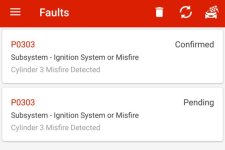Soldato
Hi all, first post in Motors as I drive a clown car inherited from work... 
I'm looking for recommendations on a good fuel additive for reducing carbon deposits... I think. I've recently had a couple of fault codes stating a misfire. No obvious bangs or lurches though, but I'm now a bit paranoid my engine's running rough.
It's a Smart, 1L 3-cylinder engine. I live in London so do loads of low speed/stop-start driving and very rarely get to high revs. Doesn't help that I try to drive the car in a fuel efficient way . Other Smart users have suggested the engines are prone to carbon/general buildup at low speeds.
. Other Smart users have suggested the engines are prone to carbon/general buildup at low speeds.
If the engine light comes on a third time I'll take it to the garage for some tests but in the meantime, it's been suggested to use a fuel additive to try and clean things up a bit.
What do you lot like to use?

I'm looking for recommendations on a good fuel additive for reducing carbon deposits... I think. I've recently had a couple of fault codes stating a misfire. No obvious bangs or lurches though, but I'm now a bit paranoid my engine's running rough.
It's a Smart, 1L 3-cylinder engine. I live in London so do loads of low speed/stop-start driving and very rarely get to high revs. Doesn't help that I try to drive the car in a fuel efficient way
 . Other Smart users have suggested the engines are prone to carbon/general buildup at low speeds.
. Other Smart users have suggested the engines are prone to carbon/general buildup at low speeds.If the engine light comes on a third time I'll take it to the garage for some tests but in the meantime, it's been suggested to use a fuel additive to try and clean things up a bit.
What do you lot like to use?


 ) It wont do anything for the backs of the inlet valves (Assuming it is a GDI engine)
) It wont do anything for the backs of the inlet valves (Assuming it is a GDI engine)
 )
)